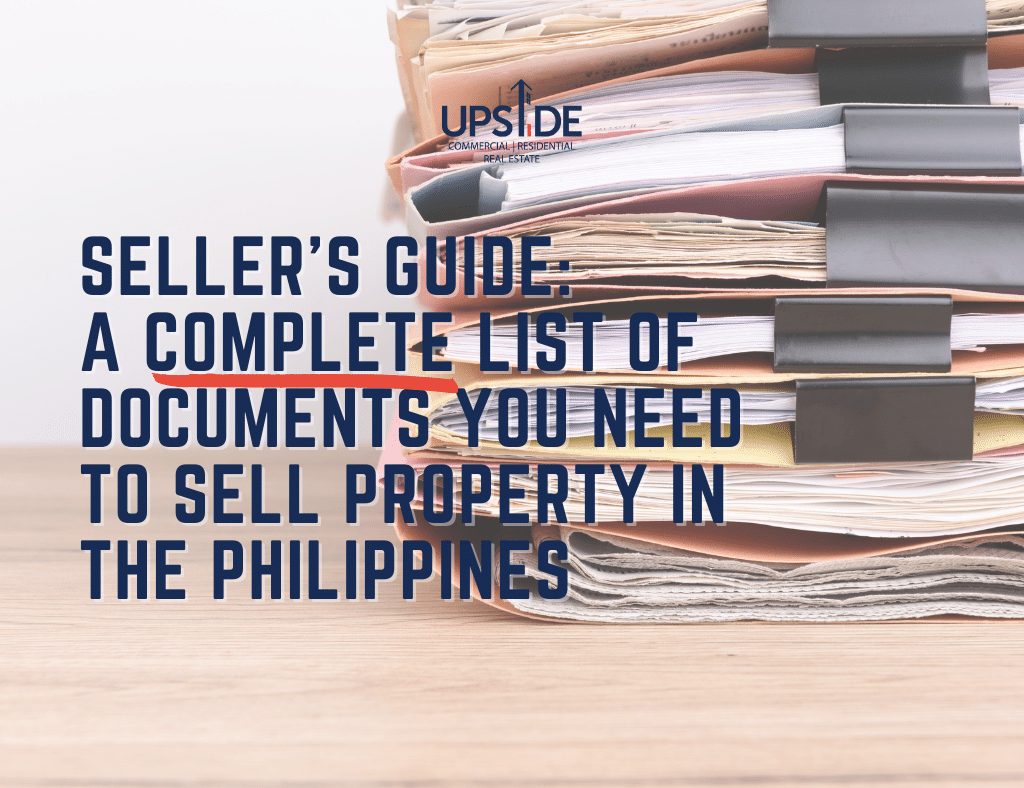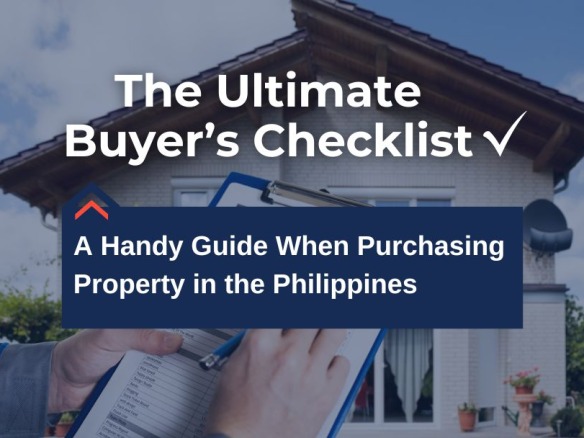Planning to sell your property in the Philippines is not as simple as we’d all like. There is a specific procedure that needs to be followed and a long list of documents that must be secured or else your property may not be sold. Take heart! Upside CEO Mitor Alipio and Managing Partner Kabbie Alipio talk about selling your property in their podcast, “Seller’s Complete Guide to Property Selling in the Philippines”.
Kabbie says, “It’s important for sellers to realize that selling your property is not as simple as posting photos online… We can shed some light on the seller’s journey from documentation to handing over your property to your buyer.” Here is a comprehensive list of all you need to sell your real estate:
Secure all your ownership documents.
Mitor stresses that even before selling your property, make sure you have a physical copy of the title in your hands. He asks, “Is the title with you, or do you think it’s with you?” Kabbie adds that the main goal of a buyer is to have the property transferred to his name. She says, “That will not happen if the seller cannot present a copy of the title.”
Obtain these important documents from the Registry of Deeds:
- Certified True Copy of Transfer Certificate of Title (Land)
If you own a condominium, get these:
- Certified True Copy of Condominium Certificate of Title (Unit)
- Certificate of Ownership (Parking, if applicable)
If you are a corporation selling property, secure these on top of your titles:
- Secretary Certificate
- Board Resolution
- Up-to-date official receipt
- Certified True Copies of SEC documents (articles of incorporation, latest General Information Sheet, audited financial statements, etc)
If you’re a seller based abroad, these are the additional documents you need:
- Special Power of Attorney if you will have a representative sign on your behalf
- Deed of Assignment of Rights (in the absence of a title for pre-selling properties, check with your developer if they will allow)
- Contract to Sell from your developer
- Latest Statement of Account
You may also need to procure these documents:
- Certificate of Management from your homeowner/village/condo association if your property is a condo unit or inside a subdivision
- PHIVOLCS Clearance. Earthquake hazard assessment to assure buyer if the property is safe.
- Location map and lot plan
- Floor plan
Double-check these details.
Mitor emphasizes, “We recommend you get the certified true copy of title ahead of time and… have it checked. It will hasten the process.”
- Your government ID must be identical to the name on the title.
- For condominiums, there is a cap on foreign ownership.
- Marital status. This is important for sellers who are separated from their spouses. As co-owner, your former spouse still has a right to decide on what to do with the property.
- Technical description. Check if your lot closes. You can employ a Geodetic engineer to check if the borders of your property meet correctly.
- You also need to check if the address in the title is your actual address. A typographical error can cause nightmares.
- Is it a clean title? If your property is fully paid, check if the annotation that the mortgage has been paid is canceled.
Fix the tax status of your property.
The owner or broker must procure these documents from the Assessor’s Office:
- Certified True Copy of Tax Declaration (Land)
- Certified True Copy of Tax Declaration (Improvements)
If you own a condominium, get these:
- Certified True Copy of Tax Declaration (Condominium)
- Certified True Copy of Tax Declaration (Condominium parking, if applicable)
The owner or broker must procure these documents from the City Treasurer’s Office:
- Tax Clearance for Current Year
Mitor says that aside from paying your property taxes, you need to make sure that your LGU is aware of any changes like improvements on your property. Undeclared changes will be subject to back taxes.
Know your expenses.
“What is the next step after getting all these documents?” Mitor asks. “Know the tax that would apply to your property. At the end of the day, you’re selling the property because you have use for the funds… You’re liquidating. You’re looking at your net. How do you know your net if you don’t know your expenses?” And the biggest expense will be taxes.
- Capital Gains Tax. This is the income tax levied on the profit gained from selling a property classified under capital assets. These are properties that are not used for trade or business, such as homes, land, and cars. A capital gains tax is 6% of the property’s gross selling price or market value, whichever is higher.
- Ordinary Assets Tax. Properties that are income-generating are classified as ordinary assets. The ordinary assets tax is 6% of withholding taxes, plus income tax, 12% VAT, and documentary stamps tax.
Mitor advises, “You really need to talk to your accountant, tax lawyer, auditor especially if it’s an ordinary asset so you can prepare legally how to minimize your taxes.”
He also gives an important tip to protect yourself: “Know the correct taxes and pay with a manager’s check.”
Taxes aren’t the only deductions from your profit. Here are additional expenses:
- Collaterals like professional photos, videos, and a 3D tour, to attract buyers.
- Advertising to bring your property to the right market
- Broker’s fees
Kabbie advises, “Get an exclusivity arrangement with a broker so that the broker can maximize the exposure of your property.” The broker will take care of the collaterals and advertising so you won’t have to worry about these details.
A broker will also be in charge of property viewings. Buying a home especially is an emotional as well as a financial investment so a buyer is keen to see potential homes. You must be willing to open your property to viewing but understand that you can’t be there personally. Many times, a buyer is intimidated to ask about the property if the owner is at the viewing or doing the home tour. What could be ordinary questions about the property like how old it is, what needs fixing, and what’s causing certain smells, could be deemed as intrusive and insulting by the owner. So it’s best to hire a broker or property manager to handle viewings.
A licensed broker can also help process the entire sale – from procuring documents, managing taxes, producing collaterals, and handling marketing and viewings. Brokers aren’t just mere tour guides of your property, they are also professionals who know all the ins and outs of selling property in the Philippines.
Prepare these documents after the sale.
Congratulations! You’ve closed the deal. Here are the documents you need to collect now that you have a sure buyer:
- Letter of Intent from the buyer. This should include price, payment schedule, earnest money, and other terms and conditions.
- Contract to Sell
- Deed of Absolute Sale
- Endorsement Letter. This is given to the property/condo administration endorsing the property to the new owner.
- Certificate Authorizing Registration
Selling property in the Philippines can be extremely complicated. The upside of knowing all the documents and other details you’ll need for selling will make the process easier and faster. Mitor says, “It’s best to know the documents you need from the get-go so that if you have a buyer you lessen the risk of losing that buyer.” Lacking the necessary documents and procuring them takes time. Your buyer may lose interest and start looking for other properties.
For a detailed guide on the seller’s journey plus interesting anecdotes, listen to Upside realtors Mitor Alipio and Kabbie Alipio share the steps that will make selling your property in Life on the Upside: Seller’s Complete Guide to Property Selling on Spotify.
LET’S CONNECT! LIKE AND FOLLOW US ON OUR SOCIALS:






Join The Discussion